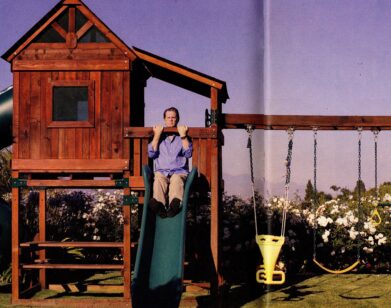in conversation
Serpentwithfeet and Terence Nance on How to Achieve #RelationshipGoals

Serpentwithfeet. Photos by Braylen Dion.
Having ascended the ranks of indie music stardom in 2018 with his debut album soil, for his sophomore record, serpentwithfeet had big shoes to fill. His own. The newly released DEACON eschews the experimental artist’s own worn shoes entirely, opting for the warmth of a lover’s, luxuriating in intimacy’s slow build. That process is made literal in the album’s lead single “Same Size Shoe,” in which he sings, “Me and my boo wear the same size shoe/Boy, you got my trust ’cause I’m like you.” It’s an ode to the platonic particulars of Black gay love, and the comfortable cocoon that is reciprocity. As he tells the filmmaker and artist Terence Nance, that’s the real #relationshipgoals. —SARAH NECHAMKIN
———
TERENCE NANCE: I just ran into Bridget [Botchway, the producer of the “Same Size Shoe” video.] She told me y’all just shot the “Same Size Shoe” video.
SERPENTWITHFEET: Yeah, we did. I’m excited.
NANCE: Can you tell me what it’s about?
SERPENTWITHFEET: It’s sort of an extension of the “Fellowship” video. It’s just me being in an intimate space with the guy who is playing my partner, love interest, and we just wanted everything to feel really warm and cozy and a little domestic. It’s really warm and cozy, which I’m really excited to do, because I haven’t done that so much. That’s sort of the space I’m in right now.
NANCE: That’s a re-brand, because the serpent brand, if I were to describe it before this moment, is epic. It’s operatic. It’s ancestral and astral. When you first played me that song—I think it was about a year-and-a-half ago…
SERPENTWITHFEET: Before quarantine.
NANCE: And the first time I heard it, the way you described it was noticing the shoes by the door, that they were the same size of this partner who you were dating at the time. And it was so revelatory to me. You live in a house where you take your shoes off at the door, which is a certain type of household, you know what I mean?
SERPENTWITHFEET: Right.
NANCE: But then it’s the other thing of like, okay, we could maybe swap shoes. And then I started feeling what it’s like, to put somebody else’s shoes on, and it feels good, because it’s somebody else’s warmth on your feet. You constructed that song with these observations that feel really everyday, so small you wouldn’t notice them, but they’re everything. What’s your observing process?
SERPENTWITHFEET: Well, thank you for all your assessments. I wanted to focus on the everyday, pedestrian concepts, the things that maybe don’t seem so profound, and just find the wonder in that. Because I think with a lot of my favorite work and a lot of my favorite artists, they take these normal ideas, and then make it something brilliant. I wanted to try to do that. Like, I have a song on that album called “Old & Fine,” and I just liked it as a twist on the idea of “I want to get old and ugly with somebody.” It’s like actually, I want to get old and fine with you. I think there’s something to be said about work that feels accessible and work that feels like you can take it with you. I don’t think it’s dumbing down. I think it’s sort of cutting some things down to size a little bit, just to make it a little more immediate.
NANCE: I remember this conversation where you told me about how you make scents out of these essences that are really specific.
SERPENTWITHFEET: I do my own essential oil fragrances.
NANCE: The everyday is the access point. The cover of the album gave me “white party” vibes.
SERPENTWITHFEET: I’m so glad you got that. White parties are such a big deal. Like, I think about the aunties with the gold teeth who drink the dark soda and the dark liquor and smoke a cigarette, and I wanted to capture that sartorially. I wanted to capture that sonically as best as I could. It’s never a thing of me trying to perform someone else or be someone else, but it’s just trying to refine my style.
NANCE: You seem so grown in your perspective on the album.
SERPENTWITHFEET: For this project, I felt more seasoned. I love being in my 30s. I’m really enjoying myself. I feel like I’ve lived many lives. I’m not even talking about past lives—in this life on Earth, I have lived. So, I just wanted to capture that sense of knowing, that sense of grounded-ness, where I’m walking with weight. I’m calling the album DEACON, because I was thinking about the deacons in the church who are so calm and have so much restraint, and I love that about them. I’ve never seen the deacons of the church raise their voice or go above a level six, because they aren’t moved by the things around them. Who are those deacons outside of the church setting? Who has deacon energy? I thought about Overton in Living Single and how he was the ballast for their apartment complex. He was always there to fix things. I love Queen Sugar. I thought about Hollywood and Remy, or even Prosper, those guys who never really get angry, but they act as the spine for that community. It doesn’t mean that these men are sterile and stoic. They just have a sense of composure that I wanted to explore this time around.
NANCE: It’s experience. Whatever it is, you have a sense of humor about it. Can you talk a little bit about the Atlanta references? You have so many specific images in there that just feel so familiar, so well-worn to me.
SERPENTWITHFEET: As I’m sure some folks know, I’m definitely still a church boy at heart. Every time I go to Atlanta, it feels like a hug. I know it’s been documented by others in film and music and otherwise, but for my own catalog, I wanted to document that feeling of going to gay clubs down South. The warmth is just different. There’s just this welcoming that happens. Before I started going to Atlanta, I thought it was going to be a strange experience. To see Black gay love on display like that is just really beautiful. Obviously, I love dating Black men, so to be in a space where that is celebrated, it’s just really powerful to me. I think down South, what I noticed is that Black men at the clubs just, there’s a certain magnetism that you don’t really find in other places. My friends hear me talk about the clubs down South all the time. But I was always saying, “I need to put this into a song.”
NANCE: It’s so vivid. You want to celebrate Black men loving Black men. That line where you’re like, “I haven’t heard truth come out of thin lips.” It’s like I could smell the song. I love that. I just felt very gratified, very invited. And I think that was really refreshing, because it just achieves what you were setting out to do, at the end of the day, which is always the hardest thing with art of any kind. Tell me about “Amir.” I had never really heard so much eros derived from this invocation of kindness.
SERPENTWITHFEET: We jammed on an idea, and came up with the sonic palate for it. And the first thing that I heard, I’m like, this sounds like meeting somebody for the first time. Something that I’ve experienced sometimes is meeting somebody who’s kind and almost second-guessing it, just almost feeling like, what’s going on here? Wanting it, definitely being happy to experience it, but also feeling like, what’s the catch? There’s this sense of reservation. So you have that line like, “You so kind, you so warm. Damn, I could shed a tear.” It really feels like that. I think as I get older, I echo a lot of things that I’ve heard mature folks say, which is that they don’t pursue the fast, hot, fiery relationship any more. They want something cool and calm. Maybe in my younger years, I wanted something fast, hot, and big, and now I’m just like, can we keep it cool, cute, and calm? That’s where I’m at now. You’re five minutes into meeting somebody, and you’re being like, damn, I like the way you stand. I like your voice. Are we going to get married? Hold on. Can we go to lunch? I don’t know if you’ve done that within the first five minutes. You’re stressed, but also excited.

NANCE: Who made us this distrustful of kindness?
SERPENTWITHFEET: Right.
NANCE: It’s the eternal question. What happened, and how do I heal it? It’s always the moderation thing. Keep your head cool. Strive for that moderated energy. Where can we find the middle? You can’t even know where it is until you fell off the edge at least four or five times. You got to fall off the seesaw at least four or five times to be able to hit that middle balance vibration, especially with other people who went through that trauma. There was a line, something related to, “Our love will stay hallowed, if we stay humble.”
SERPENTWITHFEET: Yeah, “Sailor’s Superstition.”
NANCE: That was a really healing thing, because for me, often the big lesson is pursuing moderation and humility.
SERPENTWITHFEET: That’s such a word.
NANCE: And that pursuit, I had never really heard it invoked as something that two people can pursue about a connection. That a connection is sentient. It’s not you or me. It’s this thing that’s grown between us. It could get too big for its britches, but it can stay in god’s favor, as they say, if it remains humble. What taught you that?

DEACON album art.
SERPENTWITHFEET: I love this word that’s coming up for you repeatedly: moderation. I think this project is a lot about that. It’s about knowing that I could use 40 colors, but choosing to use seven. It’s all about just turning down the volume a little bit, and I think with “Sailors’ Superstition,” there’s a few things I was thinking about. The first thing was that poem, “Rime of the Ancient Mariner,” that there’s this part where there’s an albatross following the ship, and the sailor shoots the albatross, and then that whole saying of wearing the albatross around the neck, because it was bad luck. It was considered a sailors’ superstition. One of the sailors’ superstitions was don’t kill the albatross that’s following the ship, because it’s considered good luck.
Then I started thinking about the myriad of sailors’ superstitions, and one of those is not to whistle on the ship, because it’s thought that if you whistle on the ship, you’ll be challenging the winds, and you’re encouraging the storms to come, and you’re asking for catastrophe. And so then I thought, okay, well, what other ships should you not whistle on? Relationships. And I think about how often when we do decide to walk in love with somebody, like you said, we think we are the only ones, that we are the best ones that ever did it. Or you start to do ‘relationship goals’ posts or ‘bae goals,’ which I’m not shitting on anybody doing that. I understand it, and to be honest, I think I’ve definitely been arrogant sometimes in the past. But I think that when you do that, you do announce yourself in a certain kind of way, and I feel like all of the spirits and the folks on the other side are like, “Cool, you think you got something perfect? You think you’re the only ones? We’re about to challenge it.” You’re inviting the wind. So I was just thinking, “Hey boo, let’s just try to keep it cute for the first year. I can meet your family. You can meet my family. We can hold hands. This ain’t some in the closet shit. We can be out and affectionate. But we don’t need to be arrogant. We don’t need to broadcast our creation story on social media.” The first line [of the song] is, “Heard the first couple stopped smiling after the first year.” Let’s just stay humble, and then the rascals and gods of the air will honor it and say, “Okay, we’ll let you keep this.”
NANCE: It reminds me of something I read about arranged marriages, where they were trying to explain it in the Western context of free will. They were like, “Well, we believe that we can’t start a relationship on the basis of romantic love, because you have to start as strangers.” And people were like, “What?” And they were like, “The rationale behind that is because if you start with romantic love, then you’re starting on top of a mountain, and if you start on top of a mountain, then there’s nowhere to go. You gonna go down. And if you just start wherever you at, then you climb the mountain together. You go on the journey together. And at some point 40 years in, you’ll be in love.” Not that everyone should do that, but you can’t evangelize what you think might be working for you to anyone else. It’s just such a unknowable magic that makes a thing work at any moment. You got to whisper around it, for sure.
SERPENTWITHFEET: I love that idea of coming into a relationship as strangers. Even in friendships, I don’t think anyone should ever get too comfortable, because the person you’re with is always going to be evolving and transforming, and you’re always going to be evolving and transforming. And I think if you always approach it as, “I want to get to know you again today. I want to try again today,” you can trust that energy more than, “I know you. We in love. We did it.” Because then it’s like, do we not have to make an effort any more? I need us to commit to growing together. I don’t know that you’re going to like the same foods next week, so I’m going to ask you again next week. “Do you still like turkey? Because you might not be into turkey.” It might seem pedantic for some, but it’s a practice that I really enjoy, and whether it’s six months or eight months or three years, things can change. Things can change.
NANCE: And then you be on your #relationshipgoals.
SERPENTWITHFEET: Right.






